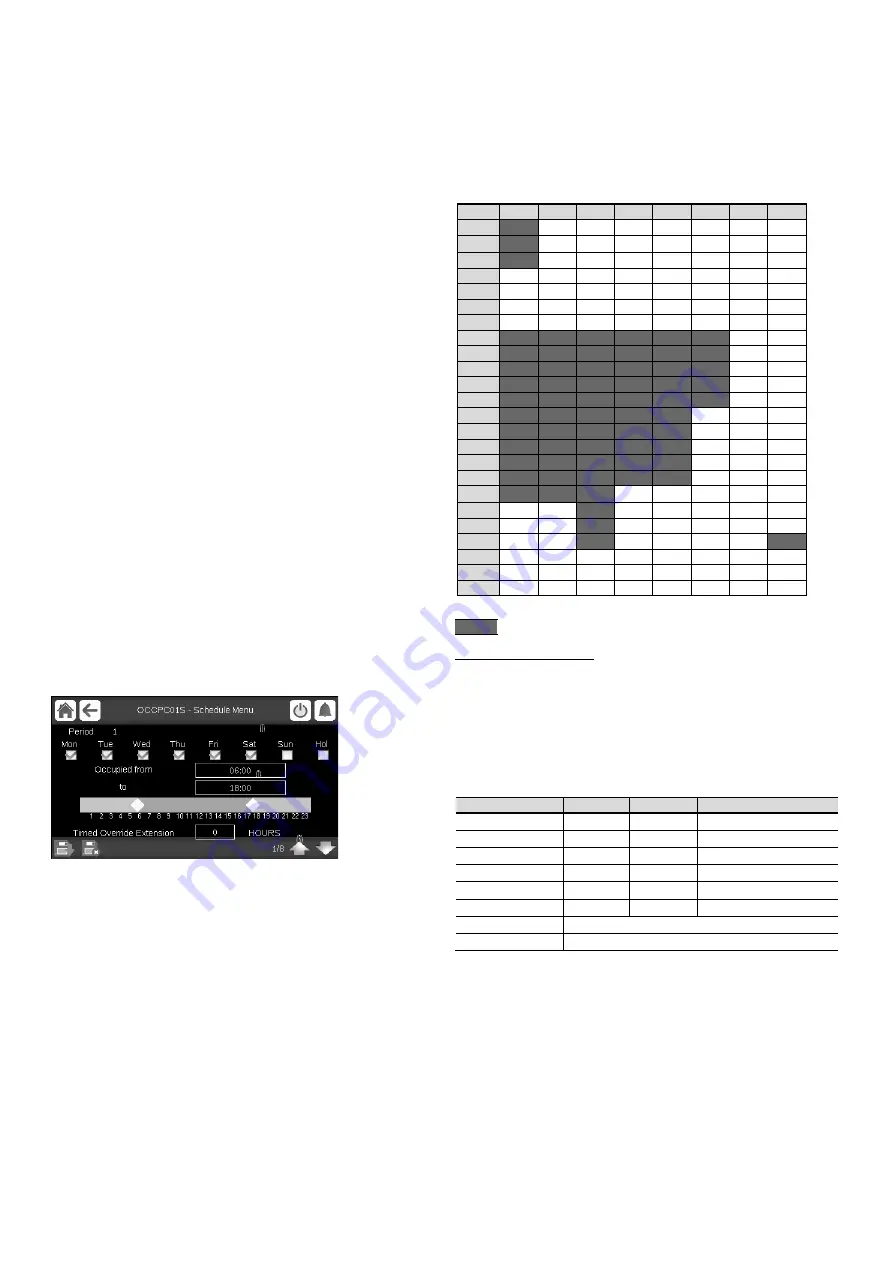
42
The first timer program (schedule 1, OCCPC01S)
provides a
means to automatically switch the unit from an occupied mode to
an unoccupied mode. The unit is started during occupied periods.
The second timer program (schedule 2, OCCPC02S)
provides
a means to automatically switch the active setpoint from an
occupied setpoint to an unoccupied setpoint. Cooling setpoint 1
is used during occupied periods and cooling setpoint 2 during
unoccupied periods.
Occupancy periods
The control offers the user the possibility of setting eight occupancy
periods where each occupancy period includes the following
elements to be defined:
■
Day of the week:
Select the days when the period is occupied.
■
Occupancy time
(“occupied from” to “occupied to”):
Set occupancy hours for the selected days.
■
Timed Override Extension:
Extend the schedule if necessary.
This parameter can be used in the case of some unplanned
events. Example: If the unit is normally scheduled to run
between 8:00 to 18:00, but one day you want the air-conditioning
system to operate longer, then set this timed override extension.
If you set the parameter to
“2”, then the occupancy will end at
20:00.
To set the unit start/stop schedule
1. Go to the Main menu.
2. Navigate to the Configuration menu (logged-in users only) and
select
Schedule Menu
(SCHEDULE).
3. Go to
OCCPC01S
.
4. Select appropriate check boxes to set the unit occupancy on
specific days.
5. Define the time of occupancy.
6. When the time schedule is set, the selected period will be
presented in the form of the green band on the timeline.
7.
Press the
Save
button to save your changes or the
Cancel
button to exit the screen without making modifications.
Legend:
1. Selection of days for the time schedule
2. Start/end of the schedule
3. Previous time period
4. Next time period
Each program is in unoccupied mode unless a schedule time
period is active.
If two periods overlap and are both active on the same day, then
the occupied mode takes priority over the unoccupied period.
Example: Schedule setting (schedule 1)
Hour MON TUE WED
THU
FRI
SAT
SUN
HOL
0:00
P1
1:00
P1
2:00
P1
3:00
4:00
5:00
6:00
7:00
P2
P2
P3
P4
P4
P5
8:00
P2
P2
P3
P4
P4
P5
9:00
P2
P2
P3
P4
P4
P5
10:00
P2
P2
P3
P4
P4
P5
11:00
P2
P2
P3
P4
P4
P5
12:00
P2
P2
P3
P4
P4
13:00
P2
P2
P3
P4
P4
14:00
P2
P2
P3
P4
P4
15:00
P2
P2
P3
P4
P4
16:00
P2
P2
P3
P4
P4
17:00
P2
P2
P3
18:00
P3
19:00
P3
20:00
P3
P6
21:00
22:00
23:00
Occupied
Unoccupied
MON:
Monday
TUE:
Tuesday
WED:
Wednesday
THU:
Thursday
FRI:
Friday
SAT:
Saturday
SUN:
Sunday
HOL:
Holiday
Period/Schedule
Starts at
Stops at
Active on (days)
P1: Period 1
0:00
3:00
Monday
P2: Period 2
7:00
18:00
Tuesday
P3: Period 3
7:00
21:00
Wednesday
P4: Period 4
7:00
17:00
Th Friday
P5: Period 5
7:00
12:00
Saturday
P6: Period 6
20:00
21:00
Holidays
P7: Period 7
Not used in this example
P8: Period 8
Not used in this example
6.36- Holidays
The control allows the user to define 16 holiday periods, where
each period is defined by three parameters: the month, the start
day and the duration of the holiday period.
During the holiday periods, the controller will be in occupied or
unoccupied mode, depending on the periods validated as holidays.
Each holiday period can be modified by the user via the
Configuration menu (see also section 5.2).









































